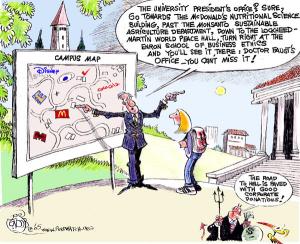Some more "Wheeling & Dealing" at our JuCos?
 "Your education is the one thing they can't take away from you boy!" was one of my Old Daddy's sayings. He stressed the value of learning for its own sake up to a point but figured it was an investment as well. I've mentioned in various posts that Governor Wallace at least in part used the JuCo system as a political network and here in Alabama nobody is likely shocked that moving money amongst the players is part of the arrangement.
"Your education is the one thing they can't take away from you boy!" was one of my Old Daddy's sayings. He stressed the value of learning for its own sake up to a point but figured it was an investment as well. I've mentioned in various posts that Governor Wallace at least in part used the JuCo system as a political network and here in Alabama nobody is likely shocked that moving money amongst the players is part of the arrangement.Despite all of this, I'm surprised that once again Brett Bleckledge of The B'ham News has delivered. Today's "Firm linked to official's brother : $135 million in business went to Merchant Capital" reveals that big money and "family values" once again intersect in our "education" efforts. Blackledge reports the following:
There's also the issue of a college scholarship awarded to Dahl's daughter from former Fire College Director Lanston's Foundation yet that's small change. The Alabama BOE must demonstrate some serious efforts to address these issues and the culture of the JuCo community.The state's two-year college system has given more than $135 million in bond business since 1999 to a Montgomery investment banking firm linked to the brother of Debra Dahl, the system's vice chancellor for finance.
Records show the bond business, which represents more than two-thirds of all bonds sold by the system since 1999, generated more than $1.1 million in fees for Merchant Capital, an investment banking firm in which Dahl's brother, Ken Funderburk, is executive vice president.
The work that went to Funderburk's firm came after Dahl's office took over all postsecondary education bond business in the state. In 1998, system officials forced all two-year colleges to coordinate their borrowing through Dahl's office, records show. Colleges hired their own firms for bond issues prior to the change in policy. ...
System records show that Merchant Capital received the lion's share of bond work from the two-year system, having been chosen to handle 20 of the 27 bond issues from 1999 through 2005. That amounted to $135 million of the $205 million in bond issues sold during the period to raise money for two-year college building projects, records show.
Dahl's office did not use a competitive process to sell the system's bonds, instead using a negotiated sale that allowed the system to select the investment banker and work out an agreement, records show. System spokesman Andre Taylor said state law does not require the system to sell bonds through a competitive process.
The system's bond records show that Merchant Capital charged the system on average more in fees than other investment bankers. Merchant Capital's average fee on bond deals was 8 basis points, or 8 one-hundredths of a percent of the total amount borrowed. In some cases, the firm charged as much as 13 basis points for bond issues, records show.
The average fees charged by other banking firms that handled two-year system bonds ranged between 6 and 7 basis points.
Had the system paid an average of 7 basis points for all of Merchant Capital's work, it would have saved more than $190,000 on the bond deals handled by the company, an analysis of the fees charged shows.
I've yet to read Jennifer Washburn's "University, Inc.: The Corporate Corruption of American Higher Education" yet her work seems relevant up to a point. Her investigative work reveals how the corporate world has often readily stepped in to help our often cash strapped school. But there's a cost. In the long run the learning often suffers when profits and funding become a focus. Campus Progress has a nice "top ten" things students should know about big business is influencing education.
At our Alabama two-year system it appears that at least one major focus of some of the "leadership" was demonstrating an intersection of both profits and funding, either for their own or another leader's "own". Again, this is an outrage, if in fact accurate, from simply a fiscal and ethical standpoint. As an educator, I'm more concerned that the culture of the schools may have been in fact less driven by the goal of stretching minds and more by lining pockets. Peace ... or War!




<< Home